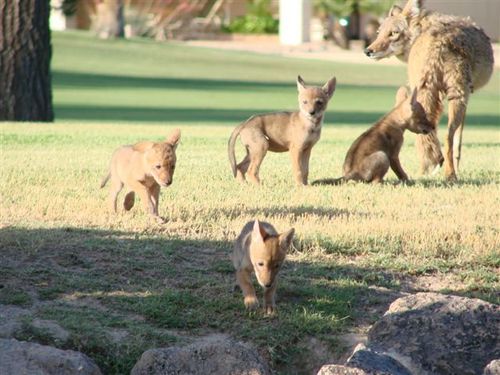The person who lives here home backs up to the Union Hills Golf Course in Sun
City. They took these pictures of the first baby coyotes born there this year.






Coyotes have a special place in Southwestern kitsch. They're often
depicted on screen-printed souvenir-shop apparel, howling at a
Swiss-cheese moon. Neither nightlights nor lampshades are immune to the
appeal of a barking 'yote, and calendars and postcards are plastered
with them. Coyotes, it seems, are all over the place, and that's
appropriate, considering they're all over Arizona.
Although most coyotes prefer to travel and hunt alone or in pairs,
you might see larger groups of them, particularly where food is
abundant. It's not uncommon to find the wily mammals in urban areas,
where refuse and fruit
 trees provide easy access to a quick snack.
trees provide easy access to a quick snack.They're also known to sneak a drink from swimming
pools and pets' water bowls, and they're notorious for seeking out a
meal of unattended, unsuspecting dogs and cats. In the wild, coyotes
subsist on small desert animals, snakes, lizards and wild fruit.
Among the shelters coyotes seek are storm drains and anything dark
and cavernous, such as abandoned buildings, dirt trenches or rocky,
shaded outcroppings along urban trails.
You'll know a coyote when you see one. Most have gray coats that are
painted with rusty highlights. Black patches on their tails distinguish
them from an average dog, and they range in weight from 20 to 30 pounds.
They're fast, too - coyotes can run upward of 40 mph.
The Arizona Game and Fish Department classifies coyotes as "curious,
clever and adaptable," all great attributes if you're not a pet named
Fluffy, Fifi or Spot.
If you encounter a coyote near your home, Game and Fish recommends
that you take action. Ignoring it could cause the animal to lose its
natural fear of humans, making it more ornery and more likely to hunt
near homes. The department suggests that you make loud noises, wave your
hands or objects such as sticks and brooms, throw small stones or cans,
or spray the coyote with a hose.
If a particularly aggressive coyote refuses to take off, maintain eye
contact and don't turn away. Some animals might view that as an
opportunity to give chase, which is fine if you're feeling like a
roadrunner. But if you'd like your coyotes on tchotchkes and not in your
backyard, call animal control.
www.azcentral.com/.../20100615arizona-highways-coyotes0619.html



Not sure if this one was sick or not.But they are dangerous and prey on them.Have not seen one for years.I always keep my dog on a leash.